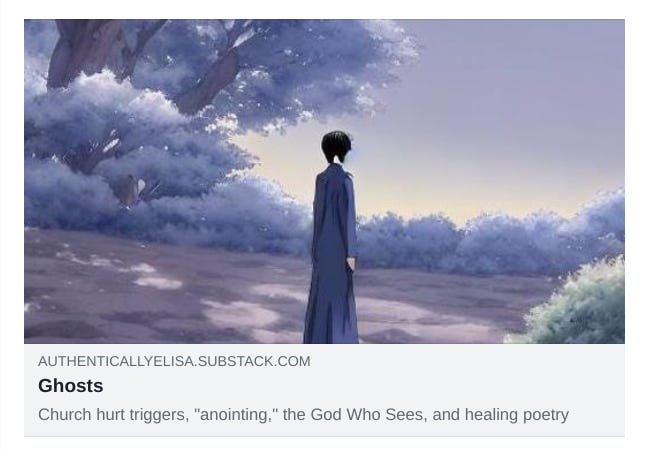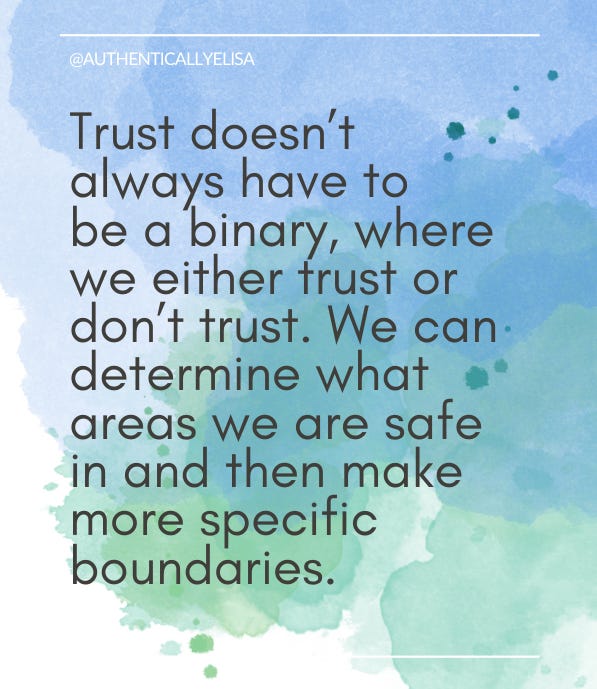So We're Talking About Forgiveness
An essay where Katy Perry, Mara, the ICU, and Trust Stars all make sense together
Katy Perry
I began my speech by (attempting) to hum three different songs by the same musician. It wasn’t until I got to California Gurls did my small audience exclaim, “It’s Katy Perry!”
Happy memories flashed in my mind from a road trip I went on with my kids a couple weeks ago, driving back to San Diego through the American Southwest. I might not love the song, but we rocked it, singing it at the top of our lungs on I-40 when California Gurls accidentally popped up on a playlist.
My daughter told me she thinks it is fun to tell her friends in high school that her mom knew Katy Perry.
Mind you, I do not know and have never known Katy Perry. But we are the same age, and come from the same small region of California’s Central Coast. We both grew up in very Christian homes and both aspired to be musicians. I remember she sang at one of our performances, back when she was Katy Hudson. I doubt we were even introduced. I viewed myself as a nobody, and her as someone to be jealous of, with connections and resources.
In a way, Katy Perry became my antithesis. Like a firework, she broke away from her faith background with, I Kissed a Girl, and grew in fame. On the other hand, I leaned into church spaces. I became a worship leader. Then I was subsequently dealt a take-down blow from the pastor who was meant to guide and protect me (I talk about it a little here). It took me over fifteen years to heal, to really begin freely singing again.
This story of healing became a message I hoped would help others. And it was why I found myself in front of a podium to speak about forgiveness this past week.
Suspicious (or auspicious?) timing
Before our drive through snowy mountains and tumble-weeds, we were in Texas. Here, I heard a woman preach on forgiveness. Her sermon was different, but it very closely resembled my own speech on forgiveness that I had last given four years ago. Hearing her brought me back. I found myself reflecting on how that was the last day before my life began falling apart in a series of very unfortunate events.
Then, a week after hearing the Texas woman’s story, someone looked at my list of presentation topics and requested I speak on “forgiveness.” I balked. How could I give that speech again? I have been chiseled and shaped by hurt. I am not even the same person who wrote it.
Mara: chiseled by bitterness
I wonder if it is a rite of passage to come to the place where we “get” Mara.1 True, I did have some significant areas where I needed to practice forgiveness, mostly in my marriage and with church crap. And although those were very hard for me to work through, I was eventually able to work through them.
So why couldn’t Mara/Naomi work through hers? I used to believe Mara just enjoyed being bitter. She must have loved being a victim of her circumstances. In fact, I remember hearing a sermon once teaching that it was her fault her family died. That their deaths actually were God’s punishment upon them for going to a foreign land to find food and security. As if she, Naomi, could make the decisions for the family in a patriarchal culture! And as if Joseph’s brothers and Jesus’ parents also didn’t flee as refugees, too, but in these stories this was lauded as a God’s provision!
Some subconscious part of me was probably judging her, “Get up ya old hag! Just let it go already!” As if it would have been easy for her to pull herself up by her bootstraps, quote a little Torah, and simply choose to have no more bad days.
I was so naive. I didn’t understand grief.
It has taken the events of the last four years to get me to the place where I can relate to and understand Mara. My experience regarding the topic of forgiveness has quadrupled. Maybe I am not actually at Mara/Naomi level of things to become bitter about, with sons and husband dying, famine-surviving, losing everything, immigrant level of bitterness. But my trust was betrayed by doctors, friends, community, co-workers, and leaders. And I undoubtedly have body-falling-apart and non-profit-exploding potential levels of bitterness.
If I let sleeping dogs lie, I’d live in a grand thriving metropolis of bitterness!
Could I genuinely share about forgiveness after all of that? For one, the Katy Perry vs. Elisa story wouldn’t cut it anymore. More importantly, I wondered, had I even healed enough to help? Or would my still raw hurt just harm my audience?
Maybe I was really asking myself if I am too Mara to do any good.
Sweet Spot
While listening to the Forgiveness-Preacher-Woman in Texas, my memory of July 6th, 2019 came crashing back with clarity. The last day before my life upended remains in full-color. I was wearing a burgundy shirt and matching patterned pants. To get closer to the audience, I stood on the edge of the stage instead of the middle. I got ink all over my hands on purpose. I used a broken pen as a visual to depict the hurts we are given that become poisonous debts marking us.
What stood out to me most was feeling like I was at the pinnacle of my purpose. I was in my sweet spot. At the time, I was speaking regularly. For the first time in twelve years since becoming a mom, my kids were going to school full-time so I could focus on writing, coaching, and leadership. I was directing our women’s ministry, revamping it alongside a great team. We were deeply invested in a vision of multiplication, ownership, and spiritual formation. It was thriving! The anti-trafficking nonprofit I founded was also at its climax—within the year we would have over twenty partner organizations! I believed we had finally positioned the right set of leaders in the right roles to tip us over the edge.
The presentation went great. I was already preparing another sermon for the following week, this time for the largest audience I’d ever spoken to.
The context for self-care
The next day I got drastically ill with some unnamed virus. Three days later, I was in the ICU on a ventilator. I had acute organ failure and pneumonia. My extreme instability made no sense to anyone, least of all the doctors. (Two years later I was diagnosed with lupus—this was my first notable flare.)
What happened between that stage and the ICU? Most of the time I was either asleep or in a state of delirium. I had no energy or space in my brain for conscious thought besides when we were supposed to take our next dose of medicine. I was entirely concerned with my kids’ health, not how ill I was.
Despite my very real belief that I wasn’t “that sick,” and against my worried exclamations of “what about the kids?,” my husband threw me in the car. He brought me to an urgent care where they immediately called an ambulance. We were told that I would have been dead within hours if my husband had listened to my protests and let me stay home “to take care of the kids” (as if that was happening anyway).
Too often the very gravity of self-care gets lost with memes about spa days. Let my story provide some context on what self-care needs to be about instead. We can literally die if we don’t become aware of our own needs and take care of ourselves. Even if we feel responsible for other people, we are responsible for ourselves first.
Dead people don’t do much
I can’t tell you how many times a day I thank God that I am still alive to be here for my kids. Everyday. Countless times. That’s what too-many near death experiences has done for this woman!
If we are dead, we don’t get to serve our families. Our audiences. We won’t get to give our gifts in our “sweet-spot.” (Nor from our weakest, most humbled spot.)
Dead people do not praise the LORD; those in the grave are silent. But we will praise the LORD now and forever. Praise the LORD! Psalms 115:17-18
When I talk about death, I don’t just mean in its fullness, where we are buried in the dirt or scattered in the wind. Death might coalesce in our bodies, but it also lurks in other ways. We’ve become too content with living partially alive, when our emotions, minds, and spiritual lives are also starving for oxygen.
Trust stars and opinions to listen to
I am not the type of person who will tell you to blindly listen to your husband. But if they are sane and you’re really sick, it is probably a good idea to let them lead. It is too easy to brush-off the concerns of people we are intimate with. What if we paid attention to and reflected on their concerns, instead?
“But how do we know if they are worth listening to, Elisa?”
Oh, this question. Thankfully, I’ve found some equipping guidance in this. In the Mentorship Circle, I pass-out a tool from LeadStories Media, the Feedback Assessment Tool. This has helped me so much.
Then, in CPT therapy last year, I used another tool during the Safety & Trust Module, called a Trust Star. (Just search Google, you’ll find plenty of examples. I recommend reading the module first.) My dyslexic brain couldn’t comprehend reading and writing on the shape’s diagonals. So I’d make my own version of it with straight lines to graph areas of trust—the far side of the page for trustworthy, and the opposite far side depicting very untrustworthy.
My therapist pointed out, “You trust the person who cuts your hair a lot differently than how you’d trust your boss. And you should.” Naming values that create trust for the different roles people have in your life is a vital part of this exercise.

Overtime, these two tools have become invaluable on my healing journey:
They’ve helped me repair trust with my husband. Maybe at the beginning of our relationship there were reasons I didn’t trust him, but he has shown me over and over again he is safe for me now.
They’ve helped me see that it hasn’t been healthy for me to blindly trust people who I thought “I should,” simply because of their role in my life.
They’ve helped me name specific ways I was hurt by people who I trusted too much.
They’ve helped me become aware of specifics to look for that I value in order to really feel safe with someone.
When binaries stop serving us
What both the Feedback Assessment Tool and the Trust Star have in common is that they cause us to consider trust outside of a binary.
We tend to think of trust as black and white: We either trust or don’t trust. But in reality, we trust because of specifics, like shared values and expectations. And we can’t trust when we are being harmed in specific ways, whether unintentionally or purposefully. The binary of trust/don’t trust doesn’t serve us in the long run. Without naming where trust was broken specifically, we struggle to reconstruct trust.
Remember that metropolis of bitterness that itches to build itself up inside me? I’ve noticed it is easier to demolish when trust seems like a possibility again. I feel confident Mara, rechristened Naomi, felt the same way.
The relevance of forgiveness
Right before I presented on forgiveness, a friend of mine told me he had also just spoken on forgiveness, using the Lord’s Prayer as his text. I was intrigued because teaching about forgiveness seemed to be everywhere I looked!
Yet as I thought about it more, my opinion changed. I felt surprised at how little I actually do hear on this topic, despite how relevant to humankind. We have each gone through hurt and injustices. And yet so many of us have no clue how to move towards forgiving others.
The best self-care
It wasn’t until long after I was off the ventilator and home from the hospital that it hit me how close I came to dying. And, then, why I didn’t get help sooner. Fast forward a year, and I seemed to be the only one who got why people were dying from COVID-19 in their homes, even with other people in the house. I knew how easily it could go from “fine” to “worse” without a way to mark the transition.
I wonder if bitterness inside our souls is similar to these viruses that attack our lungs. The little things (or big things) we carry don’t give us an “Alert! Danger zone!” alarm. Then the next thing we know is that we can barely breathe, let alone function, because we are living in so much pain, trauma, and hurt, entrenched in grief.
Maybe this is one of the best ways to practice self-care internally. To recognize we need a path towards healing. We’ll also meet forgiveness on it. But we must find its gate quickly, for our own wellbeing.
The speech
I rewrote my speech. I presented it to a small and intimate group. I was grateful that I wasn’t totally triggered as a shared, a sign I am on the right path. I noticed gaping wounds have scabbed, and are on their way to becoming scars.
I also noticed a scab or two that was still oozing, needing attention. That is okay. I don’t have to pretend I am an expert, with a neatly tied-up ends. I can be where I am on the journey of healing and forgiveness and this is enough for today.
“Then the women of the town said to Naomi, “Praise the Lord, who has now provided a redeemer for your family! May this child be famous in Israel. May he restore your youth and care for you in your old age. For he is the son of your daughter-in-law who loves you and has been better to you than seven sons!” Naomi took the baby and cuddled him to her breast. And she cared for him as if he were her own.” Ruth 4:14-16 NLT
If this post was helpful, please tap the heart 🖤 icon and leave a comment. Your engagement encourages me greatly. And when you engage here, it helps these words reach others waiting for them.
Mara is found in the Bible’s book of Ruth. She is also called Naomi, who was the mother-in-law of the main character, Ruth.
You can find past posts visiting authenticallyelisa.substack.com
Follow me on Instagram here @AuthenticallyElisa.
On Average Advocate this week: How Can We Sustainably Engage With the Media As Changemakers?








Thank you friend for sharing your story and this reminder on forgiveness. As someone who has scars, some from church, several from Christians, I have struggled to find forgiveness for others. Yet, the journey through finding forgiveness for others has also revealed my own need for forgiveness. If we allow ourselves to fall into that pit of bitterness, getting out can be a hard, often slow, heart revealing journey.